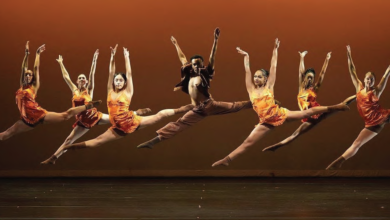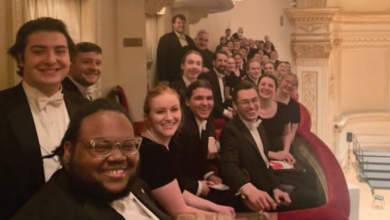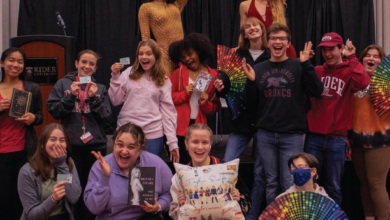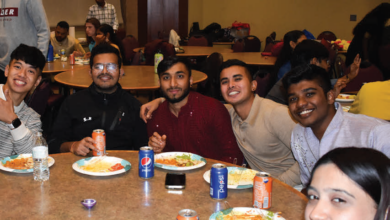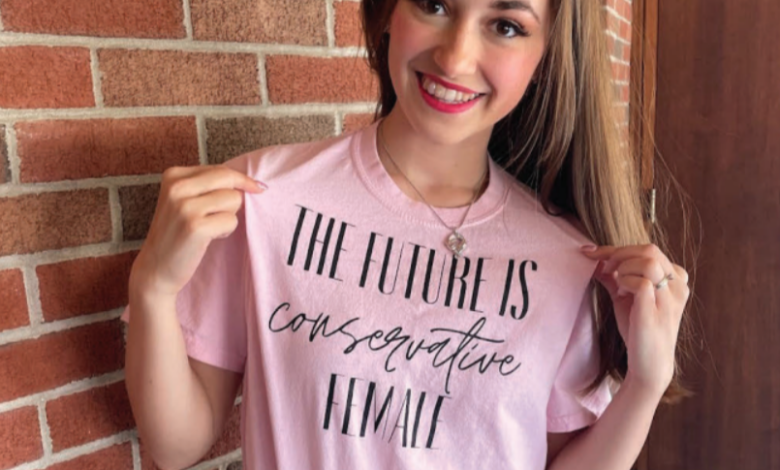
Opinions and politics: conservative organizations on campus
By Kaitlyn McCormick
From the front of Sweigart room 119 near the end of the spring 2022 semester, Grace Rykaczewski asked a group of around nine students to introduce themselves with a fun fact and favorite ice cream flavor before they spent the next hour discussing a “post-Roe” America. Mere months later, the United States Supreme Court decision in Dobbs v. Jackson effectively struck down the long standing precedent to abortion rights established by Roe v. Wade.
Rykaczewski, now a senior music education major, is just one of the number of students active in conservative organizations on Rider’s campus, such as the university’s chapters of anti-abortion organization Students For Life America (SFLA) and self-proclaimed “community organizers of the right,” Turning Point USA (TPUSA).
At a time when social and political climates are so polarizing, a look into this generation’s conservative population could be telling.
Unfolding conservative ideologies
Rykaczewski, president and founder of Rider’s SFLA chapter and secretary of TPUSA, was not always so outspoken about her passion for conservative ideals, a notion that not many would guess from her social media presence under the handle @ProLifeBarbie and what seems like a never-ending wardrobe of pink T-shirts splattered with political slogans.
“Growing up as a kid, I was always really soft spoken. I was really shy, believe it or not …but that’s just the way I naturally was,” Rykaczewski explained from the corner of the empty classroom following the departure of the SFLA attendees after that spring semester meeting. “But, because I had a conviction to speak up about the things I believed in, I was kind of put in these situations where I was forced to grow a very thick skin.”
This conviction led her to be an active member with SFLA as a national organization, engaging in speaking events across the country to speak out against abortion, which she described as a “mass genocide, a slaughter of millions of innocent human beings.”
Senior geology major Jake Lee, vice president of both SFLA and TPUSA, as well as TPUSA’s campus coordinator, faced a similar journey in confidence before identifying openly as a “huge outspoken conservative.”
Lee goes by @BasedShark on Instagram, his indicated pronouns “ne/ver.”
After attending a TPUSA event his freshman year, Lee found the courage to be open about his political viewpoints.
Wearing a dark blue shirt with “real men protect preborn lives” in bold letters, Lee explained in a spring interview, “My door was painted, it was covered in Turning Point posters, my backpack has a million pins on it. I do it because I realized that there are so many people on this campus and in the world that are so afraid to voice their opinions like I was.”
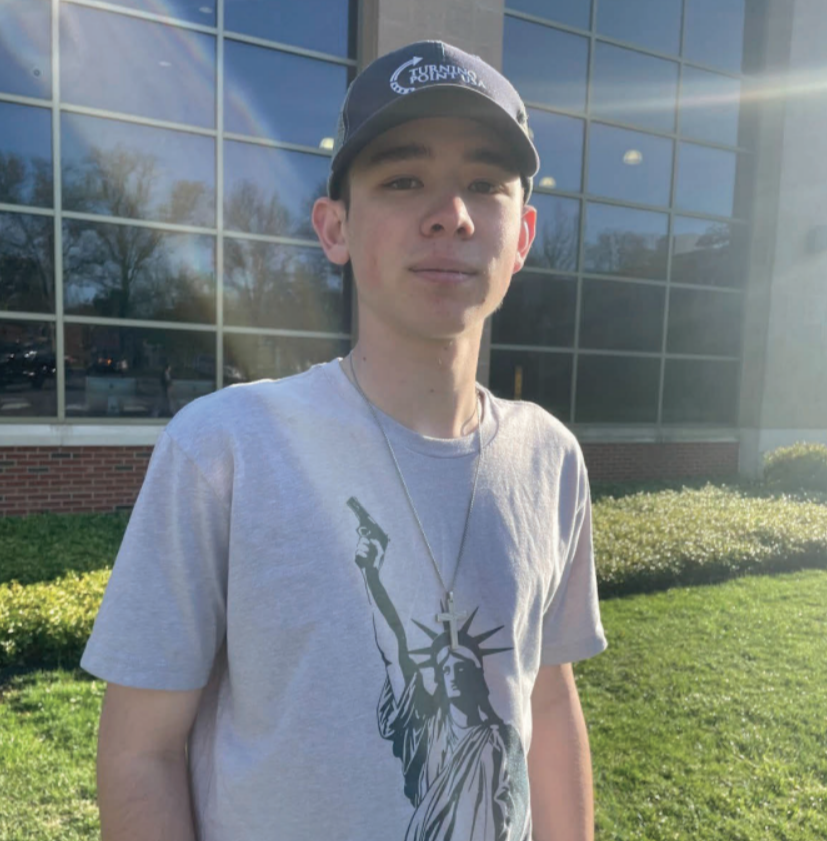
Campus reception
SFLA and TPUSA’s heavy exposure at Rider with consistent tabling, speaking events and prominent social media presences have resulted in pushback not only from members of the general Rider community, but on a personal level for these conservative students.
Lee explained that many of the SFLA and TPUSA members are intermingled between organizations, and Rykaczewski noted that many of these students found a community within each other after losing friends due to their politics.
In an updated interview with the Rider News this August, Rykacewski, who was present at the Supreme Court for the Roe v. Wade reversal, said she experienced a lot more “hostility” from fellow students, even some she would consider friends, for her viewpoints.
“They were coming after me on social media, calling me a horrible person for being pro-life,” Rykacewski said. “When abortion was the law of the land, then it was fine to be friends with someone who is pro-life because they weren’t successful yet.” Now, she explained, it has been “surprising” to get a “different kind of hatred” since the Supreme Court decision.
Students like junior psychology major Kayla Ailey, the vice president of SPECTRUM, Rider’s LGBTQ+ club, was asked about the ways in which conservative rhetoric has the potential of being received, not only on a campus level but in the greater scheme of national dialogue related to controversial politics.
Ailey said that a lapse in a clear mission statement may contribute to campus reception of these conservative clubs: “I think that’s why sometimes they get a lot more backlash than other clubs. … I don’t think people understand what they’re trying to do.”
Although students like Rykaczewski and Lee cite being “shunned” by peers after “coming out” as conservative, Ailey said about SFLA and TPUSA’s presence tabling on campus and then seeing students in class, “When you have a point of view that’s harmful to others, it can affect other people’s learning environments.”
Senior Spanish major Joe Giambelluca, president of Rider’s Planned Parenthood Generation Action chapter, said that his experience on the opposite side of controversial topics like abortion rights at Rider had been vastly different than his conservative counterparts.
“The only pushback I experience is from Turning Point and SFLA,” Giambelluca said.
Hypothesizing why these organizations are received differently in the Rider community, Giambelluca explained his belief that TPUSA’s events especially “spread a lot of anger and debate and confusion among the community.”
Last fall, a TPUSA event discussing critical race theory from a conservative lens was counterprotested, and a petition was started on change.org to have the chapter removed from Rider’s campus.
The Rider TPUSA Instagram page is riddled with conservative memes and graphics. “We are women. Not Womxn,” one photo read, with the caption, “Happy WOMEN’s history month!!”
Another post depicted organization members holding signs with slogans like “capitalism cures” and “only criminals wear masks.”
Rykaczewski’s Instagram page, tag lining her as a “walking political scandal,” features pink and pastel conservative talking points and anti-abortion rally snapshots. A video of Rykaczewski’s pink sparkly handgun resided just a few rows up from a photo of her cosplaying in an orange wig for her job as a children’s party princess.
Inviting civil discourse
The presence of groups like SFLA and TPUSA, as well as the reactions they have garnered, play a direct role in a greater conversation surrounding the value of civil discourse and contribution to the marketplace of ideas. What many people grapple with, however, is the line between accepting a difference of opinion and acknowledging rhetoric that some may receive as harmful or offensive.
And yet, despite this reception, members of these organizations remained adamant about wanting to engage in conversation.
Rykaczewski said, “One of the things that is really hard for people is we’ve gotten to a place in our society where we don’t talk with each other, we talk at each other”
Lee shared that while he has changed people’s minds about various topics in the past, he has also had his views swayed on issues like the death penalty through conversing with people whose opinions differed from his own.
Lee said, “I would say that, if you’re on the outside of TPUSA or SFLA and looking at us, just know even if you don’t share the same beliefs as us, we don’t hate you … and I don’t want you to hate us.”
